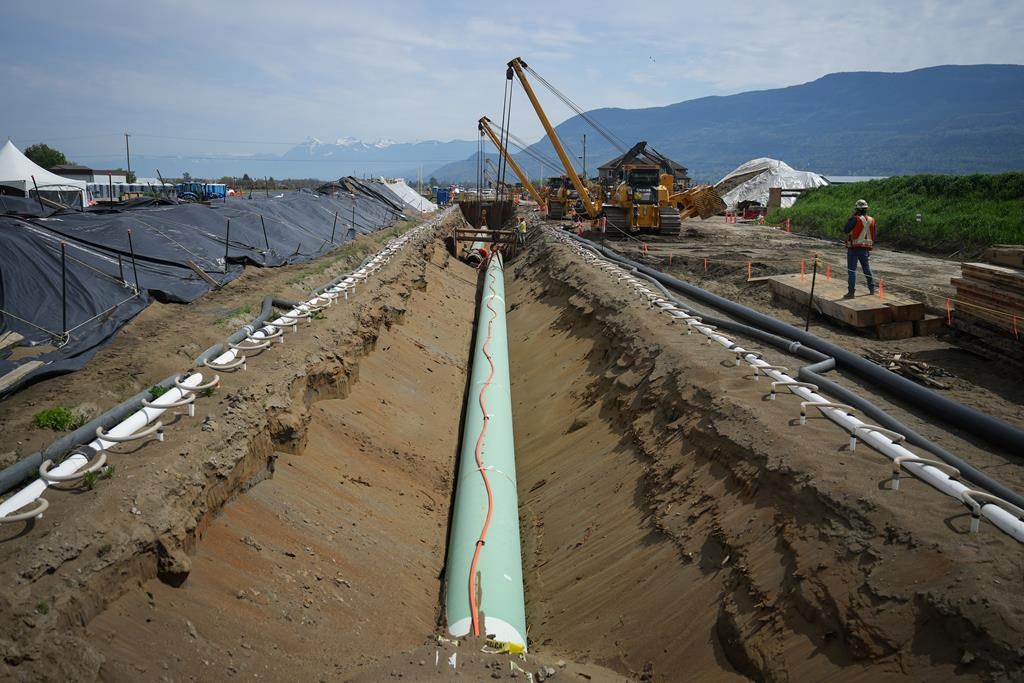The CEO of Pembina Pipeline Corp. says the company needs more certainty over timing, regulations and costs related to the Trans Mountain expansion project before deciding whether to make an offer for an equity stake in the pipeline.

The Calgary-based pipeline company formed a partnership in 2021 with Western Indigenous Pipeline Group for the purpose of pursuing an Indigenous-led equity stake in Trans Mountain.
That partnership, called Chinook Pathways, is one of just two entities _ the other is a group called Project Reconciliation _ that has publicly expressed commercial interest in the federal government’s pipeline divestment process.
Ottawa bought the Trans Mountain pipeline, Canada’s only pipeline system that transports oil from Alberta to the west coast, in 2018 to ensure a planned expansion would be completed after previous owner Kinder Morgan Canada Inc. threatened to scrap the project.
But the federal government has always stated it does not wish to be the long-term owner of the pipeline, and recently launched the first phase of what is expected to be a two-part divestment process.
Pembina Pipeline CEO Scott Burrows told analysts on a third-quarter conference call Friday that neither Pembina nor Chinook Pathways are eligible to participate in this first phase, which involves talks with more than 120 Indigenous nations located along the Trans Mountain route to see if any of them are interested in an equity stake.
Phase 2 will involve the consideration of commercial offers for the remaining stake in the pipeline, but Burrows said the timing of that is unclear.
He added that there are still many unknowns surrounding the Trans Mountain expansion project, which is still under construction and expected to be complete sometime early next year.
“Based on public information, the earliest the divestment of the asset could likely occur is the end of 2024, and there appears to be outstanding regulatory, construction and tolling issues that pose further schedule, costs and timing uncertainties,” Burrows said.
“Pembina, like any other prudent commercial purchaser, requires the many outstanding issues related to the project to crystallize in order to prudently and appropriately assess the opportunity and determine next steps.”
The sale of Trans Mountain is expected to be one of the largest commercial transactions in Canadian history.
Yet there is uncertainty around what the present value of the Trans Mountain pipeline actually is. Though bought by the federal government for $4.5 billion, the capital costs of the pipeline’s expansion project have ballooned to more than $30 billion due to construction-related challenges.
In addition, Trans Mountain is currently negotiating with oil companies the pipeline tolls _ fees oil shippers pay to move oil on the pipeline. Those tolls are the way the pipeline earns revenue, and will have a direct impact on the amount a prospective buyer is willing to pay.
It’s also unclear how large an equity stake might be sold to Indigenous communities during Phase 1 of the process.
There is also uncertainty around the expansion project’s completion time frame. Though Trans Mountain Corp., the Crown corporation behind the project, successfully argued for regulatory permission for a route deviation earlier this fall to address construction challenges related to the construction of a tunnel in B.C., the project continues to face hurdles in its final stretch.
This week, the Canada Energy Regulator issued a temporary stop-work order on the project due to what it said was Trans Mountain’s environmental non-compliance related to a wetland near Abbotsford, B.C.
The regulator has ordered Trans Mountain Corp. to stop work in the area until the issues are corrected and the company submits a safety inspection and report.
Pembina Pipeline Corp. on Thursday reported record adjusted earnings of $1.02 billion for the third quarter of 2023.
The company said based on these results, it is raising its full-year earnings guidance range for 2023 to between $3.75 billion and $3.85 billion, up from a previous estimate of $3.55 billion to $3.75 billion.

Comments